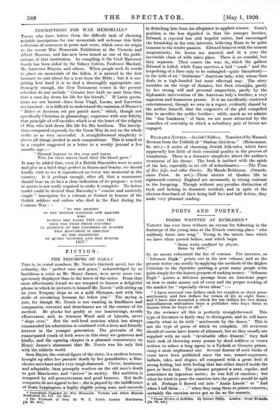INSCRIPTIONS FOR WAR MEMORIALS. * THOSE who have before them the
difficult task of choosing suitable inscriptions for war memorials will welcome this little collection of sentences in prose and verse, which owes its origin to the recent War Memorials Exhibition at the Victoria and Albert Museum, and has now been issued as one of the publi- cations of that institution. In compiling it Sir Cecil Harcourt Smith has been aided by Sir Sidney Colvin, Professor Maekail, Mr. Laurence Binyon, and others. When people seek fit words to place on memorials of the fallen, it is natural in the first instance to cast about for a text from the Bible ; but it is sur- prising how hard it is to find a thoroughly appropriate one. Strangely enough, the New Testament verses in the present selection do not include Greater love hath no man than this, that a man lay down his life for his friends." If Latin quota- tions are not barred—lines from Virgil, Lucan, and Lucretius are inserted—it is difficult to understand the omission of Horace's
Dulce et decorum est pro patrift mod," which, though not specifically Christian in phraseology, expresses with rare felicity that principle of self-sacrifice which is at the heart of the religion of Him who laid down His life for His brethren. The inscrip- tions composed expressly for the Great War do not on the whole strike us as very successful. A straightforward simplicity is above all things needed in such compositions. This is aimed at in a couplet suggested in a letter to a weekly journal a few months ago :—
" Eternal honour to the true and brave
Who for their native land their life-blood gave."
It may be added that, even if a British Simonides were to arise and give us a brief elegy perfect in fitness and beauty, we should hardly wish to see it reproduced on every war memorial in the country. It is perhaps enough, after all, that a monument should bear on its face a clear indication of its purpose : a text or motto is not really required to make it complete. No better model could be desired than Macaulay's "concise and austerely simple" inscription for a column at Scutari in honour of the British soldiers and sailors who died in the East during the Crimean War :—
" TO THE MEMORY OF THE BRITISH SOLDIERS AND SAILORS WHO DURING THE YEARS 1854 AND 1855 DIED FAR FROM THEIR COUNTRY IN DEFENCE OF THE LIBERTIES OF EUROPE THIS MONUMENT IS ERECTED
• BY THE GRATITUDE
OF QUEEN VICTORIA AND HER rzormE.
1857."


































 Previous page
Previous page